This week we could talk about the Feast of The Three Hierarchs, which falls this Sunday, January 25. But we’ve already done that: https://frbillsorthodoxblog.com/2021/01/29/232-the-three-hierarchs-january-30-the-feast-of-learning/
Or we could talk about the Great Feast of the Entrance of our Lord Jesus Christ into the Temple, which falls next Tuesday, February 2. But we’ve done that, as well: https://frbillsorthodoxblog.com/2018/01/26/49-groundhog-stole-candlemas/
So, let’s talk about Pascha.
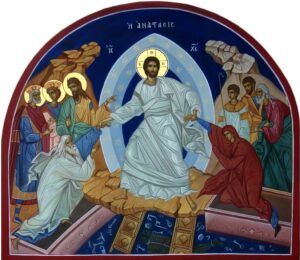
Are we way ahead of ourselves? Yes and No.
Beginning this next Sunday, we begin our l o n g journey towards the Greatest Feast of all: Pascha (Easter), which falls on April 24 this year – almost three months away. Between now and then, the Holy Orthodox Church gives us five or four Sundays * and two seasons to help us prepare. That explains the peculiar title of this week’s Post.
- Explanation below.
Preparing for Pascha
I hear that in some Christian traditions, life goes on as usual till suddenly BANG! it’s Palm Sunday, Maundy Thursday, Good Friday and Easter.
We Orthodox scarcely know what to make of that. It seems unnatural to us, not in accord with “real life”. A fine wedding ceremony or having the family in for Thanksgiving or getting ready for Christmas – all require much time and careful preparation. So does raising a garden or a crop. Most notably, it takes a baby nine months to get born and then eighteen more years to reach adulthood, with a lot time and effort and preparation required of the parents.
So should it be surprising that we have a period of preparation before all major Orthodox feast days? For lesser feasts, it’s only a few days. However, before Christmas, we have a forty day Advent Fast. And Pascha, the Greatest Feast, is preceded by (hang on) Holy Week, which is preceded by the forty days of Great Lent, which is preceded by the three Sundays of Pre-Lent, which are preceded by the Sunday of the Canaanite woman (in the Greek and Antiochian tradition only, which is where I belong), which is preceded by the Sunday of Zacchaeus, which for us is this coming Sunday.
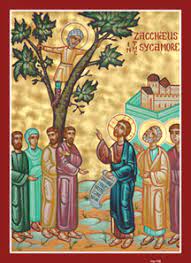
courtesy of Christ the Savior site
Why all this preparation? We certainly don’t need that much time to get the church ready. I mean, we could sweep the floors and find some Easter lilies at the last moment. No. We need all that time to get ourselves prepared.
And that will be what our Posts are going to be about for these next three months: exactly how the Church teaches us to prepare for Pascha, so we can truly celebrate the Day of Days, the Resurrection of Christ.
“Are we ever going to get to Zacchaeus?” you ask. Yes. But, just as with Pascha, we’re working up to him s l o w l y. Be patient. First we have an important point to make.
Preparing for our Salvation
I think our Orthodox approach to Pascha flows directly out of our understanding of how to achieve salvation, yours and mine – and even the world’s, if this poor world will ever have it.
Being “saved”, as Orthodox understand it, is not a one time event. It’s a long-term process. We need to give ourselves to the Lord and be “saved” every day. Saint Paul advised: “work out your own salvation with fear and trembling” Philippians 2:12 The New Testament word for salvation (soteria, σωτηρία) suggests “fullness, wholeness, completeness”. That is, we are being saved not only from evil but also to goodness. To be saved requires us to let the Lord Jesus, step by step, change us into the kind of people He means us to be: remade into the image of God, completely filled with love of Him, love of people. Achieving salvation is a process which begins in ths life and continues in the next, until finally… well, we can’t describe what it is, not yet. “Eye has not seen, nor ear heard, nor has it entered into the heart of man, the things which God has prepared for those who love Him.” I Corinthians 2:9
May I speak personally? I’m 83 now, and I know I’m nowhere near what God wants me to be. I still have a long way to grow. I still need more time to “work out my salvation”. Have you read C.S. Lewis’ Chronicles of Narnia? In the last book of the series the main characters are finally on “the other side”, and then it’s still “further up and further in!” Please God, let it be.
What does this have to do with Pre-Lent and Lent and Pascha?
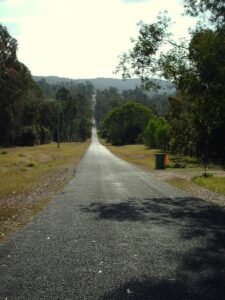
For one thing, these seasons symbolize and remind us how “narrow is the gate and difficult the way which leads to Life.” Matthew 7:14
Sue Allen (Creative Commons License)
Far more important, keeping a good Lent and Holy Week is one more intensive step on our personal journey towards salvation – so that by the time we’ve passed through the next three months, learning and praying and fasting and repenting and growing, we’ll be just a little closer to our goal – the fullness of salvation.
See how neatly everything in the Orthodox Way fits together.
And that brings us finally, believe it or not, at long last, after much preparation, to our first step on the journey to Pascha.
The Story of Zacchaeus
Gospel: Luke 19:1-10
The Scripture readings during on these Sundays leading up to Great Lent were set up long ago by the Fathers in order to show us how to make use of this Holy Season to come, how to repent, how to draw nearer to God, how to grow towards salvation.
For this Sunday and next, only the Gospel readings carry this theme. Then, beginning the First Sunday of the Season of Pre-Lent, both the Epistle and the Gospel will do so.
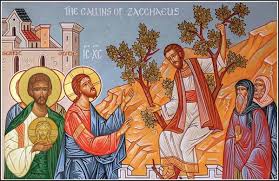 Zacchaeus was a little man physically, and also morally and spiritually. He was a tax collector. (The formal title was “publican”, that is “public tax collector”.)
Zacchaeus was a little man physically, and also morally and spiritually. He was a tax collector. (The formal title was “publican”, that is “public tax collector”.)
courtesy of Pravmir
Do you know the tax system in Palestine in the First Century? If you hate paying money to the IRS now, believe me, it was far worse then. Zacchaeus collected taxes for the Roman oppressors, the foreigners who occupied the Holy Land. Even worse, here, believe it or not, was how publicans like Zacchaeus collected taxes. Each tax collector was assigned a quota for his district. So he collected his quota any way he could, and anything he gathered over his quota was his to keep! and who could resist a temptation like that?
Still worse, most tax collectors didn’t tell people how much they owed. So they browbeat ordinary folks into paying as much as they could wheedle out of them, while the rich and powerful out of their great resources paid just enough to get the tax collectors off their backs. *
- Have the rich and powerful figured out a way to do that today? I can’t remember.
This was why, in the Gospel accounts, publicans like Zacchaeus and Matthew were rich and had many wealthy friends, and why ordinary people utterly despised those rats. When Jesus sometimes “hung out” with tax collectors, hoping to save their souls, people complained “He eats with tax collectors and sinners”. Despicable! “People are known by the company they keep.”
That’s often true. I once knew a teen-age girl who, with the best of intentions, decided to hang out with a bunch of moral “losers” in order to bring them to Christ and to a better life. Sadly, she wasn’t strong enough to handle it. Instead, they pulled her down. It was a story with an unhappy ending. You should be careful, too.
However, Jesus Christ is strong. And He knew Zacchaeus was a publican who was sick of being a sinner, who was determined to see HIm, no matter what it took, even if he looked foolish.
But we’ve got ahead of the story.
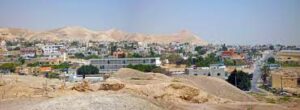
Jericho today. Daniel Case (Creative Commons License)
Jesus of Nazareth was coming through Jericho. He was now popular, and a big crowd came out to see Him. As we said, Zacheaus was a little man, and he couldn’t see anything among all those people. What was he to do? Cleverly he climbed up into a sycamore tree. And then to his amazement, maybe to his embarrassment at first, Jesus looked up at him and said “Zacchaeus, hurry down. I must stay at your house today”. Zacchaeus must have been shocked. How did the Lord know his name? It doesn’t say.
And so, it says “Zacchaeus received him joyfully”, and he repented. This was major repentance: “Lord, I’m going to give half my goods to the poor, and if I’ve cheated anyone I’ll repay it four-fold.” What brought Zacchaeus to that point so quickly? Again, it doesn’t say.
That’s all this Sunday’s Gospel reading says about Zacchaeus – although there’s more to the story, which I’ll tell you in a moment.
So what is the message to us as we begin our approach to Lent and Pascha? That’s not hard to figure out.
Brothers and sisters, we all are little people like Zacchaeus. Perhaps not physically – though I at my advanced age am shrinking fast! But like Zacchaeus we are all small spiritually, sinners who fall far short of what we should be, who need to repent. One purpose of Pre-Lent and Lent is to lead us to repentance, to acknowledge our failings and turn our lives around and head in the right direction, towards Jesus Christ and salvation.
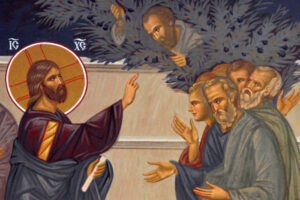 courtesy of Saint Elisabeth’s Convent, Minsk, Belarus
courtesy of Saint Elisabeth’s Convent, Minsk, Belarus
The beginning of this process is for us to seek Jesus, put ourselves up in a place where we can see Him. As we proceed towards Pascha, the Church will show us many ways to do so. In fact, You and I are doing it right now. There are certainly more entertaining Blogs than this! and more amusing things you could find to do. You could right now be watching HBO or ESPN instead of this. At least deep down, you must be seeking God here, hoping against hope that you might see something from the Lord here. I’m hoping and praying for that too.
But far more important, as we journey towards Pascha the Church will show us a multitude of ways to seek Jesus, see Jesus. Be faithful now, and you’ll see Him. For, as with Zacchaeus, so with us, He looks at us and says: “I must eat at your house today.” He wants to come to your “house”, be with you, be part of your life, and to bring you to repentance, you sinner.
“But”, you say, “I’m certainly not as bad as Zacchaeus!” Well, that’s not for me to say. Or for you, either. All I know is that, if you’re Orthodox every Sunday in the Liturgy, you confess “I am the chief of sinners”. (That’s a quote from Saint Paul. That’s how he saw himself. I Timothy 5:15 And I think that, deep in your heart, you know that you also have a long way to go before you will attain your salvation.
So, as we approach Great Lent and Pascha, Sunday by Sunday He will come to us in the Holy Eucharist, the Body of Christ, and He indeed allows us to eat and drink with Him. He comes to us, reaches out to us in the people around us who are the Church, the Body of Christ. He is present with us in the Holy Scriptures. He comes to “our house” in so many ways, no matter whether we’re always aware of it or not.
His purpose is so that, with Zacchaeus, we can come to repent. And now it gets serious, folks. He wants to rid our lives of whatever evil is in us, our “besetting passions”, and to change our ways. So that day by day, and Sunday by Sunday, we can make a little more progress on that long slow road towards Pascha, and that even longer road towards salvation.
As we approach Lent… go climb a tree! Sit up there with Zacchaeus. Start planning your Lenten rule now: how to repent better, pray more, learn more, love more. Do whatever you need to to do to see Him better and know Him better and allow Him to come to you. There is always more of our infinite Lord to see. You think you’ve seen Him already? We’ve all only just begun. There will always be still more of our Lord and God and Savior Jesus Christ to see.
Oh, yes, the story of Zacchaeus has a surprise ending. This little man became one of the Seventy Apostles. Tradition says he followed Saint Peter on some of his missionary journeys, and then became Bishop of Caesarea over on the Mediterranean coast, where he died in peace. In the Orthodox calendar, April 20 is the feast day of Saint Zacchaeus! Who would have imagined?
by Demetra Sarras, from 1867 original (Creative Commons license)
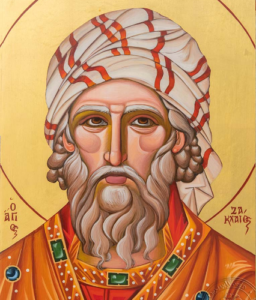
Holy Apostle Zacchaeus, former tax collector, former crooked nasty rotten hateful little sinner, pray for us and for the salvation of our souls..
Now, for the first time in Blog history, I’m going to be consistent and follow along with the Church’s calendar week by week, come ![]() or high water. I hope this will be a wonderful, challenging, soul-energizing journey towards the Resurrection of Christ, and towards our resurrection, our salvation – for all of us, including me. I need this.
or high water. I hope this will be a wonderful, challenging, soul-energizing journey towards the Resurrection of Christ, and towards our resurrection, our salvation – for all of us, including me. I need this.
Next Week: the ” Canaanite Woman
Week after next: First Sunday of Pre-Lent – the Publican and the Pharisee
Thank God for your help, Fr Bill
Gregory, you’ve got your priorities straight!